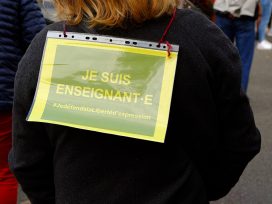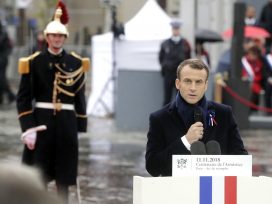The disconnect between religion and culture
It is no longer possible to contrast a “secular” West with a “religious” East, writes Olivier Roy. Secularization and the de-culturation of religion are taking place in both East and West. The difference is the political forms that the de-culturated religions take.
We Europeans live in secular societies and not in pre- or post-secular societies. Secularization has prevailed globally, even in Muslim countries. Of course, that does not mean that people have become irreligious. A society can consist of a majority of believers and still be secular, as in the United States.
In order to explain this assertion, which might sound paradoxical when the world is being shaken by the rise of the “Islamic State”, it will be necessary to discuss the changing nature of the link between culture and religion, and particularly the “de-culturation” of religion.

“…the changing nature of the link between culture and religion”. Submerged church, former town of Potosí, Venezuela; December 2005. Photo: Juan Tello. Source: Flickr
There are many different ways to define secularization. As a social phenomenon, it is not an abstract process; it is always the secularization of a given religion, whose nature changes as secularization unfolds. Common definitions of secularization include three elements.
The first is the separation of state and religion, of politics and confession, without necessarily entailing a secularization of society. The United States is a good example: although there is a strong separation of church and state, levels of religiosity among the population are still high. The First Amendment of the American Constitution stresses both secularity and religious freedom.
The second element in definitions of secularization is the decline in the influence of religious institutions in societies. Activities such as healthcare and education are now managed by the state or the private sector. In Europe, the churches have clearly withdrawn from the “management of society”.
The third element in definitions of secularization is what Max Weber called Entzauberung – the disenchantment of the world. This does not mean that people become atheists, but that they care less about religion. Religion no longer plays a major role in our everyday lives, even if we still consider ourselves part of a religious community. In this sense, secularization corresponds to the marginalization of religion in society, rather than its exclusion.
In terms of the separation of politics and religion, all contemporary states are secular – including theocratic states. A secular theocracy might sound like a contradiction in terms, but it is important to recognize that a secular state is one that defines what religion is, not vice versa. In one of the few theocratic states in the world today, the Islamic Republic of Iran, the head or the “guide” is a politically appointed figure; no such institution ever existed in Islam. The guide is elected by means of a complex constitutional process, not because he is the highest religious authority.
Iran provides a clear illustration of the contradictions that necessarily exist in any religious state. The law of the land is the religious law and sovereignty is supposedly with God. Yet the problem is: God does not speak. If God is sovereign, who knows what God is saying? And what precisely is the religious law? In Iran, parliament may pass no law that contradicts Islam. The Council of Guardians can say “no, this law is not in conformity with Sharia”, but it has no right to legislate. So what if parliament approves a law and the Council of Guardians declares it to be un-Islamic?
The solution was to create a third instance, the “discernment council”, whose task is to broker an agreement or overcome the stalemate. And what is this third instance? It is a political institution, made up of all the hierarchs of the regime. It cannot be otherwise. In all states that claim to have an Islamic constitution, or have no constitution at all because there is no constitution in Islam, the last instance of power is always political.
In Saudi Arabia, an Islamic state without a constitution, it is the king who decides in the last resort – although there is no king in the Koran and the king is not entitled as a religious man. In Afghanistan, the Taliban placed the Islamic judges in charge and declared Sharia the law of the state. They decided that the country needed no supreme court or constitution and that every judge should implement Sharia directly. Of course, this did not work, since every judge had his own conception of Sharia. In the end, decisions were taken by the head of the regime, Mullah Omar, a self-proclaimed amir al muminin or “commander of the believers”.
It is only a matter of time before the “Islamic State”, which has seized a huge territory between Iraq and Syria, encounters the same difficulties. It has benefitted from favorable local circumstances, primarily the support of Arab Sunnis that have been excluded from state power, yet it disregards the social fabric. Instead, IS implements a harsh, superficial and literalist conception of Sharia alien to the local culture.
The jihadi espouse a Salafist conception of Islam (although the majority of Salafi are not jihadi). Salafism is presented as the reaction of traditional society and culture to westernization and modernization. However this is very far from being the case. Salafism is a perfect example of a religious confession that no longer defines itself via culture, but via a set of norms, even against the dominant culture of the place they find themselves in. The Wahhabi in Saudi Arabia are destroying the old city of Mecca and replacing it with a very western commercial mall, where sharia norms – closing during prayer, the veil – are applied to a modern material culture.
It is no coincidence that the first target of the Salafi are the traditional Islamic cultures. When the Taliban took power in Afghanistan, the first thing they destroyed were elements of the traditional Afghan way of life. They forbade all kinds of games: kite-flying, animal-fights, and so on. However they allowed soccer. Did they find soccer more halal than traditional Afghan games? IS is perfectly modern in its culture: gore and violence borrowed from video games and contemporary movies, recruitment among uprooted and disenfranchised western Muslims and converts, manipulation of western media, coupled with the destruction of historic buildings.
It is not surprising that fundamentalist movements contain many converts. People who convert frequently want “the real thing” – they are not attracted by religion as a cultural form. The Europeans who convert to Islam and go on jihad rarely bother to learn Arabic or Turkish. They use French, German, English, which they dot with Arabic. Nor do they dress like traditional Egyptians or Saudis; instead, they create their own combination of visual markers: white garb and Nike shoes is apparently the symbol of conversion.
Foreign jihadi never integrate into the society which they are supposedly fighting for: failure to convince local tribesmen to give them their daughters means they resort to rape and kidnap. Tensions soon arise, and ultimately they must use coercive methods to maintain their grip on the local population. The religious dimension gives way to sheer relations of power.
Secularization has prevailed. We are all living in secular societies. By this I mean that everywhere religion has been evicted from the dominant culture. And where religious forms have not been evicted, it is religious fundamentalists themselves who are doing the job of secularization, since they consider the dominant culture not only to be profane, but also pagan.
American evangelicals, Egyptian Salafi, Israeli Haredim, conservative Spanish bishops: all consider the dominant culture in their own country to be secular and hostile to “true” religion, even if the majority of the people are religiously observant. Take the two Catholic Popes before the incumbent Pope Francis. They were clearly worried by the fact that contemporary European culture is no longer a Christian culture. Benedict even used to say it was “a culture of death”.
It is not only the Catholic Church that considers the dominant culture materialist – a culture where the human being has replaced God, where freedom has replaced duty. In a sense, religious fundamentalists are right about this. Since the 1960s, the old moral order has indeed been replaced by a new dominant culture. This culture is based on freedom, particularly sexual freedom, and materialism; for the most part it is in total contradiction with the teaching of the Church, of the Koran or the Torah. And for this reason you get religious preachers in the US, in Saudi Arabia and in Israel who all say the same thing: “We are in the minority.”
The dominant culture, the cultural mainstream of the societies we live in, is no longer inhabited by religion. This is also true for most Muslim countries. When the Arab Spring began, no one referred to religion. People went on the streets for democracy, freedom and human rights, against corruption and despotism. True, the Islamists won the elections in Tunisia and in Egypt; but they were removed after two years. They failed because they thought they had the recipe for building an Islamic State. However, attempts to build a purely religious state are doomed. In Egypt, the Muslim Brotherhood lost the monopoly on Islamic politics. Their demise was to a large extent caused by the emergence of other groups, in particular the Salafi.
Egypt is an example of a Muslim country in which the dominant culture is no longer religious. Or more precisely: it is no longer religious in one way only. Even if the new military regime claims to be fighting for the restoration of traditional values, it is clear that there has been a “secularist” backlash. In Tunisia, the opposition to the Nahda Islamist movements openly espoused secular values.
The religious field is diversifying and secularism and even atheism are becoming options for a youth that rejects patriarchal authoritarianism. The younger generation do not defer to religious hierarchies but use the internet to discuss among themselves. What we are observing in Egypt is an opening up of the religious field; however this democratization of religious thinking is not necessarily of a liberal kind.
The disconnect between religion and culture has been indirectly reflected by the recent debate on freedom of religion, both in the West and in the Muslim world. In the US, Evangelicals and Catholics protest against “Obamacare”, which could force employers to pay for employees’ contraception. For many religious people, and not only Muslims, the French laÏcité seems like a way to expel religion from public sphere. Even in countries where religious freedom is constitutionally guaranteed, a debate has emerged on the meaning of this freedom. With faith communities and mainstream society ceasing to share the same moral culture, new conflicts arise around conceptions of family, gender and procreation.
Nevertheless, there are two ways of looking at freedom of religion. One is as a collective right, and more precisely as a minority right. The Muslim Brotherhood have no problem with this: they believe that Christians have the right to be Christians, as a collective. However, freedom of religion can be also seen as an individual right, and this is more problematic in countries and regions where one religion dominates. The German state of Bavaria, for example, bans the veil for school teachers while maintaining the right of a teaching nun to wear Christian garb. Italy, while recognizing the freedom of religion, also refuses equal rights.
In Muslim countries, the issue is about conversion from Islam to Christianity: conservative ulamas see this as an infringement of the divine law and therefore something to be prohibited by the state. Here one can observe a link between democratization and the right to renounce Islam. As soon as one accepts the idea that religious belonging is an act of free will, one can accept democracy, and vice versa. In my view, this debate is now taking place in Muslim countries. The new Tunisian constitution is the first constitution in an Arab country to guarantee freedom of consciousness and freedom of religion. The latter is defined as a collective right, the former as an individual right.
I anticipate that acceptance of this freedom will grow in the Middle East. For the first time, you have people in Tunisia and Egypt who describe themselves as secularists and even atheists. Today, it is not something one dares not to say. In Morocco and Algeria, a movement is rising of people who break Ramadan openly. Under what law would you arrest them? “Public disturbance”, perhaps – but who decides what “public disturbance” is? Again, the state.
This rise of pluralism in attitudes towards religion is a clear sign of a new tolerance and acceptance of individual differences. It is a sign of secularization. Fasting is no longer seen as a duty but as an individual preference, religion less as a part of the dominant culture than a personal choice. This de-culturation of religion enables the democratization of society.
It is no longer possible to contrast a “secular” West with a “religious” East. Secularization and the de-culturation of religion are taking place in both East and West. The difference is the political forms that the de-culturated religions take. Jihad in the Middle East is certainly not identical with the Tea Party, which in turn is not to be equated with the Catholic conservative backlash against same sex marriage. But all are the consequences of the same eviction of religion from mainstream culture.
Published 20 August 2015
Original in English
First published by IWMpost 115 (English version); Neue Zürcher Zeitung (German version)
Contributed by Transit © Olivier Roy / IWM / Eurozine
PDF/PRINTNewsletter
Subscribe to know what’s worth thinking about.
Related Articles

Macron’s rhetoric on ‘Islamist separatism’ has inspired even more strident defences of laïcité on the right. Many see this hardening of attitudes as a final refutation of leftwing prevarications. But in reality, the debate on Islam in France remains confused at best.

Sates of crisis
Letras Libres 3 /2020
‘Letras Libres’ focuses on constitutional crisis in Spain and globally, including articles on the impacts of EU membership on the Spanish state; regional autonomy and polarization; and Catholicism as state religion.





